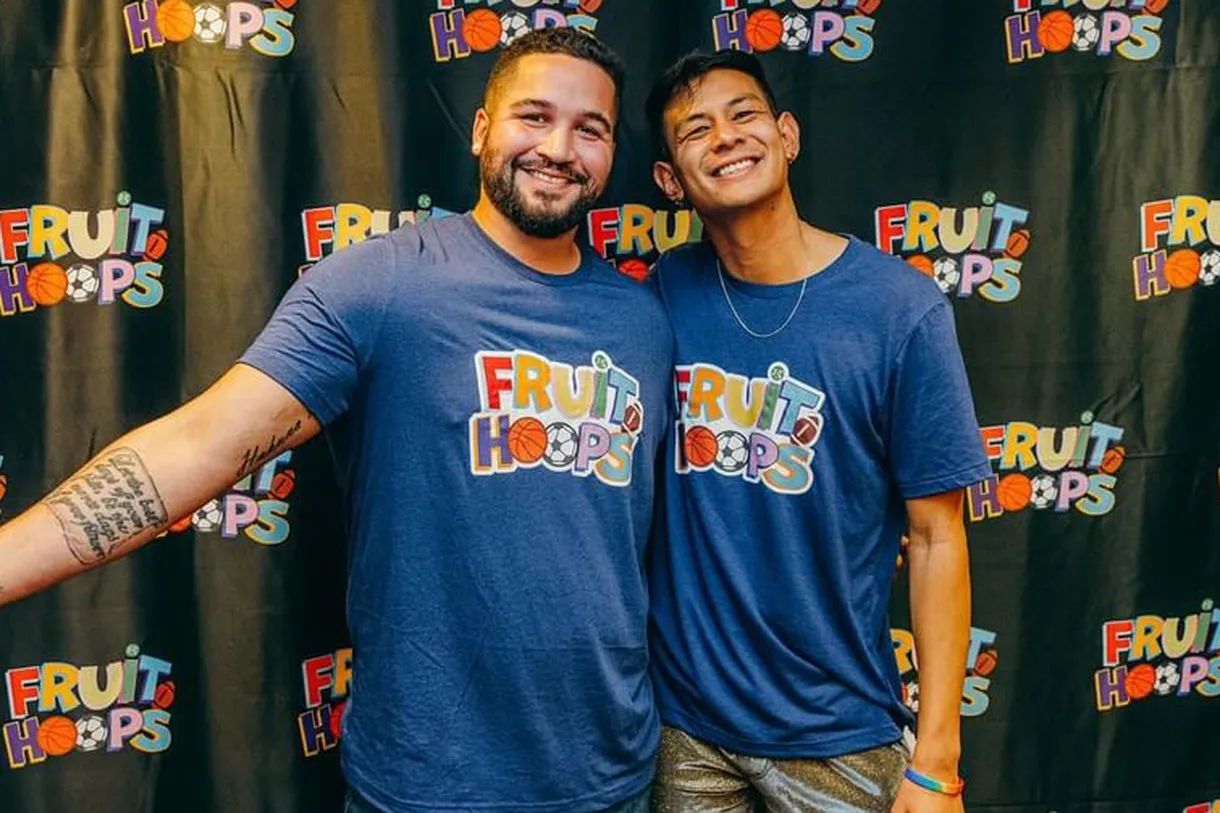LGBTQ sports leagues are a great way for people in the community to make new friends and bond around a shared love of playing games together. In fact, Outsports itself got its start when two guys met playing gay flag football in Los Angeles.
For Scott Ureta and Ty Millard, they also were a starting point for a venture into sports media.
After becoming friends while playing in the Los Angeles-based Lambda Basketball League, Ureta and Millard eventually teamed up to host a new LGBTQ sports podcast called “Fruit Hoops.”
Described by Ureta as “ESPN meets E! News,” “Fruit Hoops” is an absorbing mix of knowledgeable sports talk by two fans who know their stuff, along with LGBTQ-centric tea that wouldn’t sound out of place in WeHo.
Get off the sidelines and into the game
Our weekly newsletter is packed with everything from locker room chatter to pressing LGBTQ sports issues.
Millard summed up their show’s tone: “Being able to talk with people, go to bars, and have actual [sports] conversations that aren’t about Taylor Swift, it’s always great.”

Launched in September of 2023, the podcast covers a range of topics including lighthearted segments like a Drag Queen NBA Starting Five and an NFL Daddies draft mixing with weightier subjects like Sean Strickland’s homophobic tirade.
“We do have something of a voice right now. We want to speak on it,” Ureta said of serious subject matter like Strickland. “We want to do the more fun stuff, but when a serious conversation like that gets talked about, that’s definitely something we want to talk about in our way.”
The two hosts originally met as casual acquaintances eight years ago in Lambda Basketball. They started hanging out more regularly with mutual friends in 2019 and eventually, they got close enough to be part of a pandemic bubble and saw each other every weekend during the COVID-19 shutdown.

While their friendship was growing, Ureta realized that he wanted to try posting sports talk-related content online. He began with Instagram videos as a solo but couldn’t find the right rhythm in his delivery to feel confident in their quality.
Eventually, Ureta’s husband noticed how comfortable he was bantering about sports with Millard and suggested they team up to launch a podcast. As soon as Ureta pitched the idea, Millard was on board.
“We get to hang out a lot more than we usually do,” Millard noted, “It’s good for us and especially good for me because I’m a very quiet, shy person. This is something that’ll open me up and get my personality out there a little bit more, get me talking. Obviously, I love sports so it was kind of a no-brainer.”
As Millard routinely demonstrates, the podcast has definitely succeeded in making him less reserved.

Their chemistry was evident from the start, with their years of friendship and mutual affection coming through, even as they recorded the first episode.
Ureta recalled how it felt on the first day.
“In my head, I’m always trying to make sure everything is right. So I ask myself, ‘Is this good? Is this good?’ And he’s like, ‘No, it’s REALLY good!’ And when I would get out of my head and actually just look at the logistics of it, I’m like, ‘Oh, it actually is naturally really good.’ Our first episode, I was like, ‘Oh, that was it?! We were just hanging out!’”
Since then, the two have grown the podcast and recently took it on the road to the Sin City Classic in Las Vegas. They also have plans to travel to San Diego for the upcoming Hillcrest Classic and would like to cover events like the Gay Bowl and Gay Softball World Series in the future.
Ultimately, the two felt that the most beneficial part of doing the “Fruit Hoops” podcast was that it provided a safe space to a community of LGBTQ sports fans looking for other people who understand their experience.
A while after starting the podcast, Ureta and Millard met a fan who recognized them from their social media videos and became excited to see them in person. They were flattered but also somewhat taken by surprise at his enthusiasm.
As Ureta remembered, the fan told them, “‘You don’t understand. I’m pretty feminine and flamboyant’ and he feels like when he’s around his straight friends, they don’t respect him as someone who knows sports and can be himself. And he feels like now he found that space to do that and to relate to people. That kind of hit us really hard. Like, wow, we really are doing something right for people and we’re just trying to maintain that.”

























